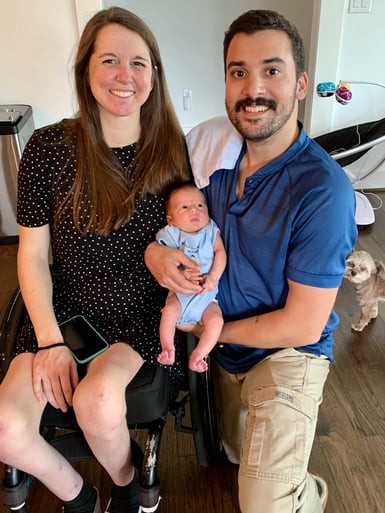Pregnant And Paralyzed: A Worthwhile Sacrifice
Join Our Movement
What started as an idea has become a national movement. With your support, we can influence policy and inspire lasting change.
Become an Advocate
This last consequence hits me both mentally and physically: for the first time, I feel wholly disabled. I haven’t been able to walk upstairs or fit through very narrow doorways since I’ve been paralyzed (17 years), but that hasn’t limited me too much; if there’s a willing person or loved one nearby, I have no shame in asking for a lift up some steps, a “pop” of my wheelchair up a ledge, or for my husband to full-on carry me into a bathroom, put me on the toilet, then carry me back out when I’m done. Now that I’m a big gal, I’m confined to my home or wheelchair-accessible public spaces.
We can all laugh at how I went from saying “Pregnancy isn’t for me” to now, where I’m rolling around with a balloon-shaped body. I don’t have insight into childbirth or postpartum yet, but I’m confident in saying that I made the right choice so far. Even if I did have a difficult pregnancy with all those negative symptoms, the baby at the end makes it worth it.
As an extra, I’m happy for how strong my arms will be after 9 months of moving my large body around. There’s that silver lining.
 Now, as I’ve come to the end of my pregnancy, I’m reflecting on the changes my body has been through and how valid (or not!) my concerns were. Before I get into it, I’ll remind you that just like no one’s body is the same, no one’s pregnancy journey is the same; where I didn’t experience fatigue, mood swings, nausea, food aversions, or cravings, your pregnancy could be defined by them.
Now, as I’ve come to the end of my pregnancy, I’m reflecting on the changes my body has been through and how valid (or not!) my concerns were. Before I get into it, I’ll remind you that just like no one’s body is the same, no one’s pregnancy journey is the same; where I didn’t experience fatigue, mood swings, nausea, food aversions, or cravings, your pregnancy could be defined by them.